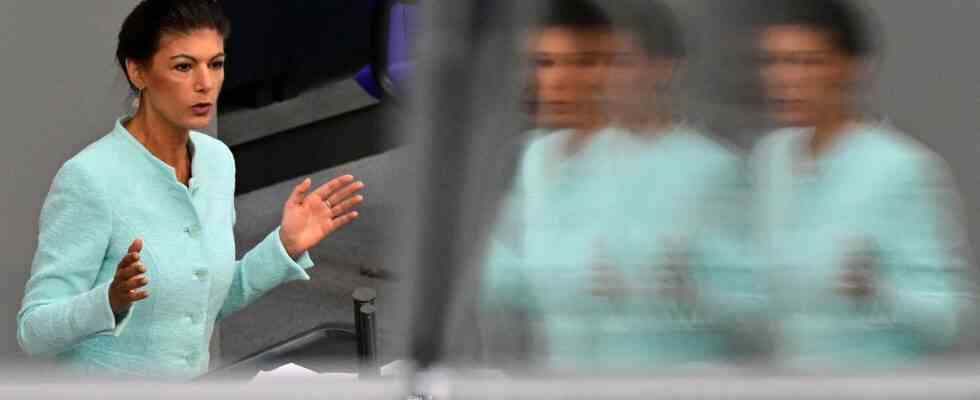End of the left candidacy
A left without Wagenknecht means less stress for the party, but also fewer votes – a dilemma
Sahra Wagenknecht is currently the best-known and most controversial left-wing politician
© John MacDougall / AFP
Apparently the politician Sahra Wagenknecht no longer feels at home with the left. She offends wherever she can, no longer wants to run for office – and dares something new? Party colleagues are skeptical.
The rejection of the Bundestag member Sahra Wagenknecht to another candidacy for the left fuels new speculation about a split in the party. Left leader Janine Wissler criticized considerations to found a new party on Saturday. Deputy chairwoman Katina Schubert accused Wagenknecht of working “for a long time on her own account” and against the party. Wagenknecht’s supporters countered this sharply.
“The years of bullying by the respective party leaders against the most popular politician in their own ranks are now having consequences,” said Alexander Ulrich, a member of the Bundestag. “I can understand why Sahra Wagenknecht is no longer prepared to run for this left. Why should she organize the political survival of a party that she fights every day?” Former party leader Klaus Ernst showed himself demonstratively with Wagenknecht on Twitter and commented: “It’s a shame that my party is disappearing into political insignificance.”
On Friday it became known that Wagenknecht no longer wanted to be in the Bundestag for the left. The “Rheinpfalz” she said: “I rule out a renewed candidacy for the left.” At the end of the legislative period, she either wants to withdraw from politics and work as a publicist and author, “or something new will arise politically”. Wissler only said: “It’s your decision. I’m not commenting on it.”
Sahra Wagenknecht: known and controversial in equal measure
It is clear that years of estrangement between Wagenknecht and her party preceded it. She joined the predecessor party PDS in 1991, was in the European Parliament and has been in the Bundestag since 2009, at times as a co-group leader. Before the federal elections in 2021, she settled accounts with a part of the left in the book “The Self-Righteous” – the young, urban gender and climate activists. When it came to migration, Wagenknecht positioned himself against the party line, as did the Corona policy.
Most recently, it was her attitude to the Ukraine war that caused offense within her own party. After a controversial speech in the Bundestag in autumn, when she accused the federal government of an economic war against Russia, her expulsion from the parliamentary group or a split was briefly discussed. The party leadership did not take part in the “Manifesto for Peace” written with the publicist Alice Schwarzer and a large demonstration in Berlin.
In the party they accuse Wagenknecht of going it alone, but also of “right-wing” theses – i.e. those that also have a place in the AfD. On the other hand, Wagenknecht is by far the best-known representative of the left. Polls attest to a party she leads with potential voters of 20 to 30 percent. It is completely unclear what such a party would stand for.
Wagenknecht’s announcement plunges Linke into a dilemma
When Wagenknecht is asked about such a start-up, it has remained very vague for months. “It’s being discussed in many places,” she now told the “Rheinpfalz”. According to her observation, it is a problem that many people in today’s party spectrum no longer really feel represented by anyone. Your followers are becoming clearer and always let it be known that preparations are already being made. Deputy Ulrich explained that the support for the Wagenknecht-Schwarzer manifesto shows “that the need for a party for peace, disarmament and social justice is more important than ever.”
This is a dilemma for the left: Although they would like to get rid of the constant stress with Wagenknecht, they could lose a decisive number of voters. She is already scratching at the minimum. In the 2021 federal election, the left failed at the five percent hurdle and only came into parliament as a faction, because it won three direct mandates.
Wissler, who leads the party in tandem with Martin Schirdewan, also called “flirting with new parties” unhelpful on Saturday. However, she also knows “no precise plans” and “no efforts to that effect”.
Party deputy leader Schubert said of the possible Wagenknecht party: “To be honest, I don’t believe in it because it’s way too much work for her after she saw how she fell on her stomach with (the movement) ‘Get up’. But even if it is so, then so be it.” Wagenknecht launched the “collection movement” in 2018, but the undertaking never really took off despite its fame and popularity.
Schubert expressed bitterness about Wagenkecht. Their “business model is to defame and badmouth people from the sidelines,” he said. “In this respect: A clarification might make some things easier.”

